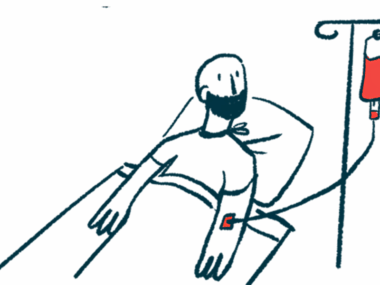MDA 2024: Vyvgart Hytrulo eases disease severity, boosts life quality
105 gMG patients entered Phase 3 Argenx-sponsored ADAPT-SC+ trial
Written by |

Vyvgart Hytrulo (efgartigimod alfa and hyaluronidase-qvfc) consistently reduced disease severity and improved quality of life across treatment cycles among adults with generalized myasthenia gravis (gMG) in an open-label extension study.
With each monthlong cycle of the injectable therapy, most patients achieved a clinically meaningful reduction in the severity of their symptoms, with some seeing them completely eliminated.
The results were presented this week by Tuan Vu, MD, of the University of South Florida Morsani College of Medicine at the 2024 Muscular Dystrophy Association (MDA) Clinical and Scientific Conference, in Orlando, Florida, and virtually. Vu’s oral presentation was titled “Subcutaneous Efgartigimod PH20 Treatment in Participants With Generalized Myasthenia Gravis in ADAPT-SC+: Interim Analyses on Quality of Life, Efficacy, Tolerability, and Long-Term Safety.”
Administered under the skin, Vyvgart Hytrulo combines the active ingredient of its predecessor Vyvgart with a man-made, or recombinant, version of human hyaluronidase PH20, an enzyme that can break down certain proteins in the skin to help deliver and absorb biologic therapies given by subcutaneous injection. Both are marketed by Argenx.
Vyvgart Hytrulo is approved in the U.S. and Europe, where it’s marketed as Vyvgart SC, for adults with gMG who are positive for antibodies against acetylcholine receptors (AChRs), the most common type of MG-causing antibody. It’s also approved in Japan, where it’s marketed as Vyvdura, for adults with gMG who haven’t responded to other treatments.
The therapy promotes a faster clearance of a family of antibodies in the bloodstream called immunoglobulin Gs (IgGs), which include the self-reactive antibodies that cause MG, easing symptoms of the neuromuscular disease.
It’s given in monthlong cycles that consist of once-weekly injections. After the first cycle, additional ones are determined based on the clinical response of the patient.
Extension study shows reduced disease severity
The Argenx-sponsored Phase 3 ADAPT-SC clinical trial (NCT04735432) compared the effects of a single cycle of Vyvgart Hytrulo (1,000 mg per injection) with standard Vyvgart (10 mg/kg per infusion) in 110 adults with gMG. Vyvgart Hytrulo was found to be just as good as Vyvgart at easing disease severity and lowering IgG antibody levels.
Most participants (105) opted to enter the Phase 3 ADAPT-SC+ trial (NCT04818671), which included 79 patients who participated in the ADAPT+ open-label extension study (NCT03770403) of Vyvgart. All are receiving Vyvgart Hytrulo for up to 3.5 years in individualized treatment regimens, where the decision for additional cycles “depends entirely on the treating physician,” according to Vu.
An interim analysis showed the medication consistently eased gMG severity with each treatment cycle over a median of six months.
Vu’s presentation focused on data from 179 patients who received at least one dose of Vyvgart Hytrulo, 141 of whom were positive for anti-AChR antibodies. At the time of the analysis, the participants had received an average of six treatment cycles over a little more than a year.
Consistent clinical responses were again observed across the treatment cycles. Among AChR antibody-positive gMG patients, about 75-80% achieved a clinically meaningful improvement — at least a 2-point decrease — on the MG Activities of Daily Living (MG-ADL), a patient-reported measure of disease severity, by the end of each cycle.
Around 35-40% of these patients achieved minimal symptom expression (MSE), or an MG-ADL score of 0 or 1 at any time during a treatment cycle. An MG-ADL score of 0 means no gMG symptoms, while a score of 1 means a person has “one symptom intermittently,” according to Vu.
“This changed the paradigm a little bit, because up until recently the goal of treatment was to make a patient better… with the newer agents we have available now, we can actually make them normal,” Vu said.
For AChR antibody-negative patients, “about 70% or so” achieved a clinically meaningful MG-ADL improvement across treatment cycles, and between 12-18% achieved MSE, Vu said.
Improved MG-ADL scores began being seen in the week after the first injection of each cycle, reaching a peak response around a week after the last one across both groups. On average, scores dropped by 4-5 points per cycle in AChR antibody-positive gMG patients and by around 3-4 points in antibody-negative patients.
Similar patterns were seen across measures of quality of life, with improvements observed in each treatment cycle.
Taken together, the findings show “consistent and repeatable” clinical improvements for gMG patients on Vyvgart Hytrulo, Vu said.
As in previous analyses, side effects were mostly mild or moderate, the most frequent being injection site redness, COVID-19 infection, and headache. Injection-site reactions were most common in the first cycle, in about 35% of patients, and progressively decreased with subsequent cycles, occurring in 11.5% during the sixth cycle.
“We are now in year three of this open-label [extension study] and hopefully we will have more data in the upcoming years,” Vu said.




Leave a comment
Fill in the required fields to post. Your email address will not be published.